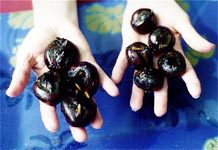Chinese water chestnuts have a sweet, crisp, and fragrant taste, making them quite popular among many people. However, health experts advise against eating them raw.
 |
|
Chinese water chestnut (Photo: earthcare) |
Chinese water chestnuts grow in muddy conditions and serve both as a medicinal ingredient and a delicious food. The reason for not eating them raw is the high risk of contracting liver fluke disease. Liver flukes are parasites that infest the bodies of humans or animals. The eggs of these flukes are excreted in feces, spread in water, and hatch into larvae, which subsequently invade freshwater snails and develop into tail-bearing larvae.
After a period, the larvae will exit the snails and attach themselves to Chinese water chestnuts, lotus stems, and other aquatic plants. When we consume raw Chinese water chestnuts, the larvae can enter the intestines through the mouth, leading to liver fluke infection within a few months. Symptoms of liver fluke disease include abdominal pain, diarrhea, nausea, frequent bowel movements, and abnormal-smelling stools.
Severe cases may present symptoms such as fatigue, lethargy, malnutrition, dry skin, and even ascites (fluid accumulation in the abdomen). If the infestation is substantial, it can form a mass that causes intestinal obstruction, which can be life-threatening.


















































